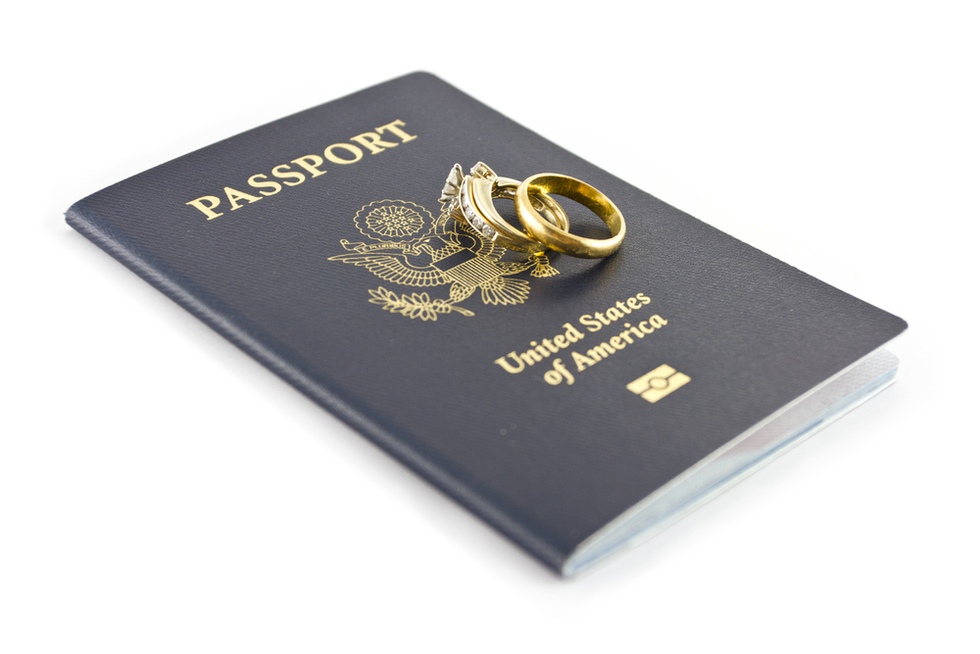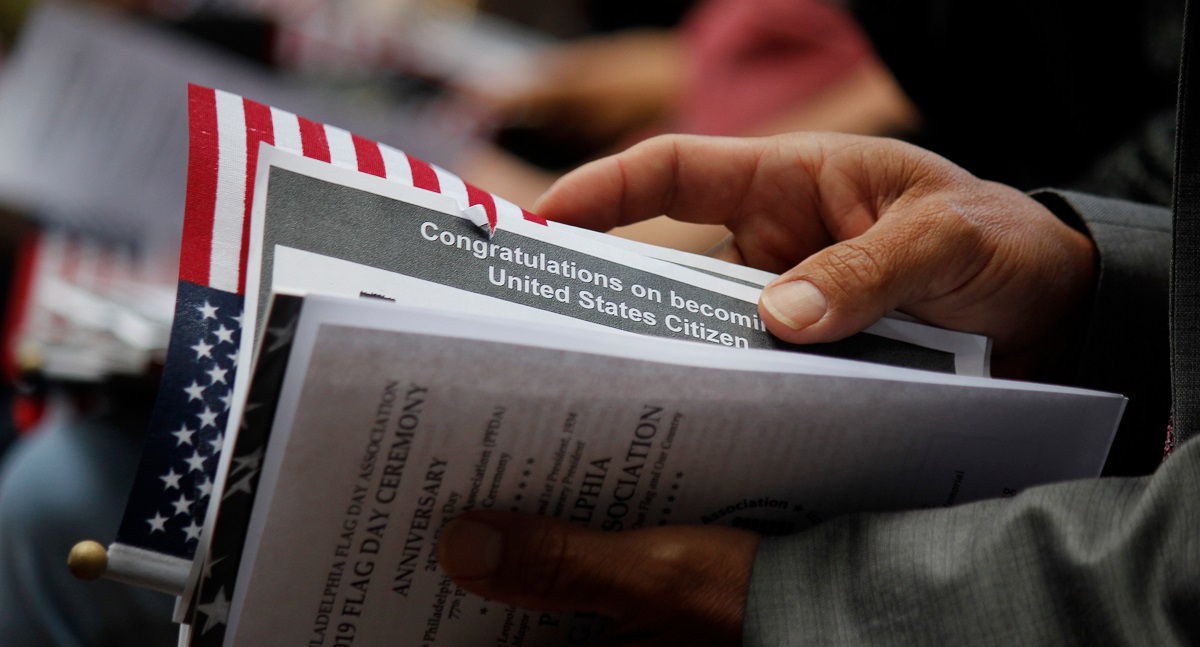
Obtaining U.S. citizenship through marriage is a dream for many immigrants and their families. This comprehensive guide will walk you through the steps, requirements, and key considerations for achieving this milestone. At CitizenPath, we understand the challenges you face and are here to support you every step of the way.
Understanding Citizenship Through Marriage
Becoming a U.S. citizen through naturalization is a process by which a non-citizen voluntarily acquires U.S. citizenship. To qualify, individuals must meet specific requirements, including holding a green card for a certain period, demonstrating continuous residence, showing good moral character, and passing English and civics tests. Normally, applicants must be permanent residents for at least five years in order to naturalize. For the permanent resident spouses of U.S. citizens, there is a special provision in the law that allows you to obtain citizenship through marriage in just three years. Successful applicants take an Oath of Allegiance, completing their journey to U.S. citizenship, which grants them the full rights and responsibilities of being an American citizen.
Green Card Through Marriage
If you want to immigrate to the United States and obtain a green card through a spouse, this comes before naturalization. The green card is an intermediate step towards eventual citizenship through naturalization. To get more information on immigrating, go to green card through marriage.
Eligibility Requirements
The Immigration and Naturalization Act (INA §319(a)) describes the special provisions for the spouse of a U.S. citizen who wants to become a citizen. To qualify for U.S. citizenship through marriage, you must meet the following requirements:
- Permanent Residency: You must be a lawful permanent resident (green card holder) for at least three years.
- Marital Union: You must be married to and living with your U.S. citizen spouse for the entire three-year period.
- Continuous Residence: You must have lived continuously in the United States for at least three years before applying.
- Physical Presence: You must have been physically present in the United States for at least 18 months out of the three years.
- Good Moral Character: You must demonstrate good moral character, which includes following laws and not having serious criminal offenses.
- English and Civics Knowledge: You must have a basic understanding of English and U.S. government and history.
For a more detailed discussion of each of the eligibility criteria, visit our page on citizenship requirements.
The Citizenship Application Process
When applying for naturalization as the spouse of a U.S. citizen, you may file the application up to 90 calendar days before you complete your continuous residence requirement.
Prepare Form N-400
The first step is to prepare Form N-400, Application for Naturalization. This form collects your personal information, background, and eligibility details. Make sure to complete all sections accurately and honestly.
CitizenPath's Naturalization Application Package makes it easy to prepare the application and provides alerts if there's a problem.
Gather Supporting Documents
Gathering the necessary documents is crucial. These documents support the application with evidence that you are eligible for the benefit. Generally, you will need:
- A copy of your green card (both sides)
- Proof of your marriage to a U.S. citizen (marriage certificate)
- Evidence of your spouse's U.S. citizenship (birth certificate, naturalization certificate, or passport)
- Documents proving that you're living in marital union (tax returns, lease agreements, birth certificates of children, photos)
- Evidence of your good moral character (police clearance certificates, affidavits)
The complete list of supporting documents will vary slightly depending on your answers in Form N-400. In addition to your prepared form, CitizenPath provides a set of personalized filing instructions. Our filing instructions are customized to your answers in the application so you know what to do for your specific situation. You'll get a detailed checklist of supporting documents, directions on how to organize your application, and where to mail it.
Submit Your Application
Once your Form N-400 and supporting documents are ready, file the application package with U.S. Citizenship and Immigration Services (USCIS) along with the required filing fee. Again, you may file up to 90 days before meeting the three-year residency requirement.
Once successfully filed with USCIS, this starts the N-400 processing time line.
Attend the Biometrics Appointment
Your first of three appointments will likely be a biometrics appointment. USCIS will schedule a biometrics screening where they will collect your fingerprints, photograph, and signature. This is a routine part of the application process.
Attend the Interview
Next, USCIS will schedule you for a naturalization interview. During the interview, a USCIS officer will review your application, ask questions about your background, and test your English and civics knowledge. Be prepared to discuss your marriage and provide additional documentation if requested. Get prepared for the citizenship test and interview.
Take the Oath of Allegiance
If USCIS approves your application, they will also schedule you a naturalization ceremony where you will take the Oath of Allegiance to the United States. This is the final step in becoming a U.S. citizen. Before the end of this ceremony, USCIS will provide you with a Certificate of Naturalization.
Common Concerns for N-400 Applicants
Applying for U.S. citizenship through marriage comes with specific concerns and requirements that applicants must address. Understanding these unique aspects is crucial for a successful application. From proving the authenticity of your marriage to meeting continuous residency and good moral character standards, these factors can significantly impact your journey to becoming a U.S. citizen. Preparing thoroughly and addressing potential challenges head-on will help ensure a smoother application process and increase your chances of achieving your citizenship goal.
Living in Marital Union
In order to qualify under the shortened three-year provision for citizenship through marriage, you must be living in maritial union for the past three years of residence and through the day of the oath ceremony. USCIS considers you to be “living in marital union” with your citizen spouse if you and the citizen actually reside together. To do this, provide ample evidence such as tax returns, joint bank accounts, leases, insurance policies, photographs, and affidavits from friends and family. CitizenPath's filing instructions and support team can help you with this requirement.
Divorce, annulment and even separation can disrupt this requirement. If problems emerge with your marriage, speak with an immigration attorney before filing or simply wait until you meet the standard criteria.
Meeting the Residency Requirements
Ensure you do not take extended trips (generally 180 days or more) outside the United States that could disrupt your continuous residence requirement. If you must travel, keep detailed records of your trips and ensure they comply with USCIS guidelines.
Many short trips can be problematic for the physical presence requirement. You need to be certain that you've been physically present in the United States for at least 18 months over the past three years. When preparing your application on CitizenPath, our trip calculator will confirm that you meet these requirements.
Passing the English and Civics Test
Preparing for the English and civics tests can be daunting. Utilize study materials provided by USCIS and consider enrolling in a preparation class. Practicing with sample questions can also boost your confidence. There are several tools and practice tests to help you prepare for the citizenship test and interview.
Citizenship through Marriage Isn’t Mandatory
In many cases, the spouse of a U.S. citizen may also qualify on the basis of five years continuous residence as a permanent resident. Applying for citizenship through marriage isn’t mandatory just because you are married to a U.S. citizen. If you are married to a U.S. citizen and you also have five years of permanent residence in the United States, you can likely have two different options for filing Form N-400. USCIS does not require you to apply for citizenship based on the marriage. Generally, it is easier to prepare an application when applying for citizenship based on five years as a permanent resident. That’s because it won’t be necessary to submit additional documents about your marriage and U.S. citizen spouse.
Same Sex Marriages
Immigration law recognizes same sex marriages in the same way it does opposite sex marriages. As long as the marriage was legal in the jurisdiction that it took place, USCIS recognizes it as a valid marriage. In cases of marriage between persons of the same sex, USCIS officers will review the laws of the jurisdiction in which the marriage took place to determine if the jurisdiction recognizes same-sex marriages and the marriage otherwise is legally valid.
Naturalization Examples
It isn’t necessary for you to have obtained permanent residence through the marriage. In other words, you may become a permanent resident first and marry afterwards to qualify for the three-year modification. Consider the following examples:
Example 1
Rosario is a Venezuelan national who meets and falls in love with Robert, a U.S. citizen. They eventually get married and Robert helps Rosario obtain a green card through their spousal relationship. USCIS grants Rosario conditional residence on 2/1/2024, and she receives a two-year green card. The period of conditional residence counts as time as a permanent resident. So if Rosario and Robert remain married, she will meet the continuous residence requirement for naturalization on 2/2/2027. Because of the 90-day early filing provision, she can file Form N-400 as early as 11/4/2026.
Example 2
Kyle obtained a green card through employment; he has been a permanent resident since 7/1/2023. After obtaining his permanent residence, he met Michelle, a U.S. citizen, and they got married on 7/1/2024. If Kyle and Michelle remain married, he will meet the continuous residence requirement for naturalization on 7/2/2027. (At this point he will have been a permanent resident for four years, but married to a U.S. citizen for only three years.) If the marriage falls apart before 7/2/2027, Kyle can still apply for citizenship after five years, 7/2/2028.
CitizenPath's Support
At CitizenPath, we are dedicated to empowering immigrants throughout their journey to U.S. citizenship. Our affordable Naturalization Package guides you through the application process, ensuring that you complete your forms accurately and submit them correctly.
Stay informed with our regular tips and updates by signing up for our newsletter below. We provide valuable information that helps immigrants and their families navigate the U.S. immigration process with confidence.
Achieving U.S. citizenship through marriage is a significant and rewarding journey. By understanding the requirements, preparing thoroughly, and seeking support from resources like CitizenPath, you can successfully navigate this process. Remember, you are not alone—CitizenPath is here to help you every step of the way.
Want more immigration tips and how-to information for your family?
Sign up for CitizenPath’s FREE immigration newsletter and
SAVE 10%
on our immigration services






